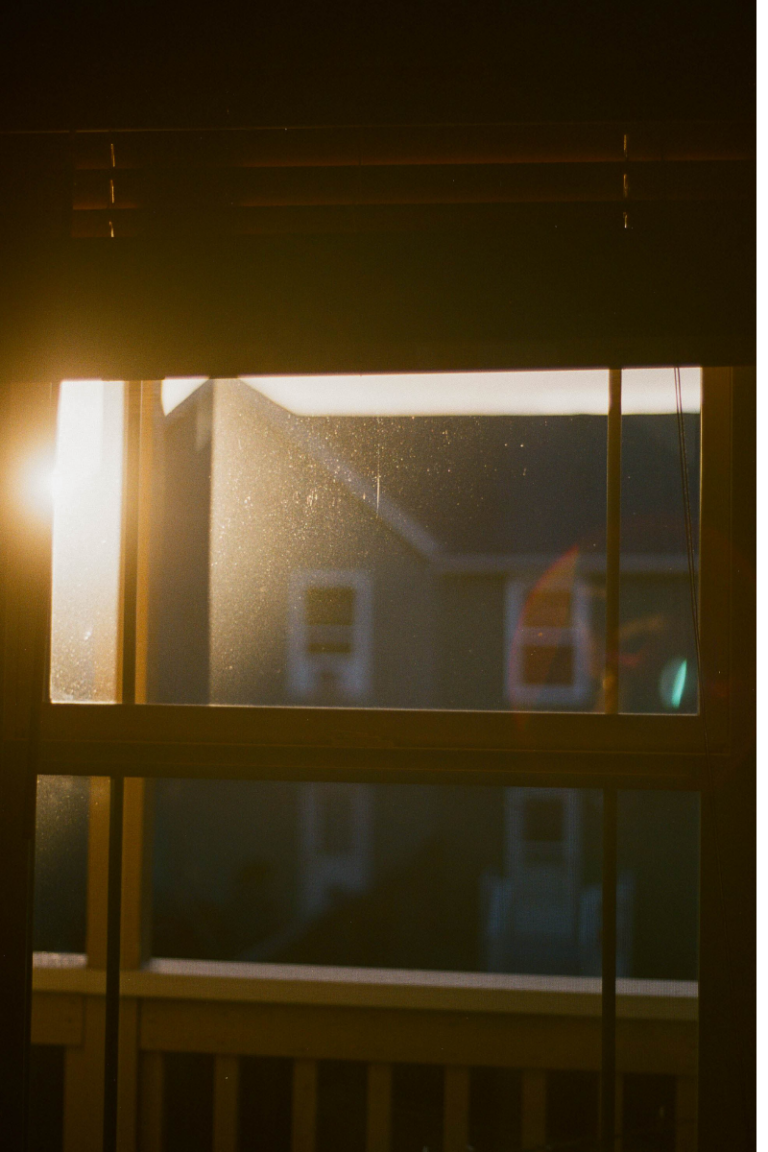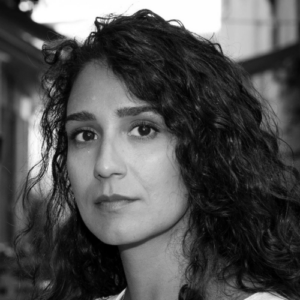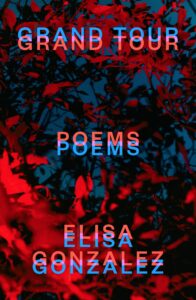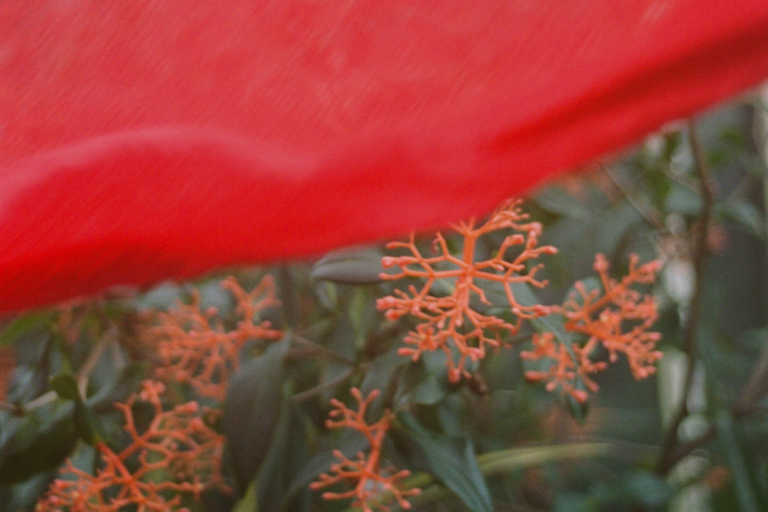Elisa Gonzalez
To My Twenty-Four-Year-Old Self
Our lives are filled with distances, the physical spans that we travel but also the stranger, vaster expanses between our past and our present or between feeling anchored and connected and feeling terribly alone. A poem can capture all of those in a way that a map can’t, as Elisa Gonzalez superbly demonstrates in “To My Twenty-Four-Year-Old Self.”
We’re pleased to offer Elisa Gonzalez’s poem, and invite you to read Pádraig’s weekly Poetry Unbound Substack, read the Poetry Unbound book, or listen back to all our episodes.

Image by Annisa Hale/ Film processed by Moody's Film Lab, © All Rights Reserved.
Guest

Elisa Gonzalez is a poet, essayist, and fiction writer. Her work appears in the New Yorker, New York Times Magazine, Paris Review, and elsewhere. A graduate of Yale University and the New York University MFA program, she has received fellowships from the Norman Mailer Center, Bread Loaf Writers' Conference, Rolex Foundation, and the U.S. Fulbright Program. She is the recipient of a 2020 Rona Jaffe Foundation Writers’ Award. Her debut poetry collection is Grand Tour (Farrar, Straus, and Giroux, 2023). Image by Simon Bahçeli.
Transcript
Transcription by Alletta Cooper
Pádraig Ó Tuama: My name is Pádraig Ó Tuama and I’ve written poems since I was 11. And I look back at some of the poems that I wrote — I’ve lost most of the ones when I was that young — but I’ve got loads since I was in my 20s and 30s and 40s. I look back at some of them and think, “Oh my God, I’m embarrassed to think that I wrote like that or that I thought that.” I see the limitations of myself, maybe even if it’s a good poem, or if I think it’s doing something technical. I also see what time was doing. And I find myself in conversations with those old poems myself, now, as someone older. Presumably that will happen in the future as well, when I’m 60, 65, I’ll look back on the poems I’m writing now and have a conversation about knowledge and time.
[music: “Praise the Rain” by Gautam Srikishan]
“To My Twenty-Four-Year-Old Self” by Elisa Gonzalez
“Sometimes you feel more intimacy with the woman who lives
in the apartment opposite—twenty years older, probably,
though she looks barely ten, devoted to evading age—
than with anyone stroked or kissed or otherwise handled.
“You sit naked on the white sofa, lights on, looking into her home,
lights on.
“She paints her toenails, watches a black-and-white film,
Hitchcock, maybe: there’s a woman with a platinum chignon.
She applies a green mask. A cream. A mystery ointment.
“When you meet an older woman who resembles her, enough,
you do the obvious thing.
“That woman says, after, Don’t ever leave me
but when you report to your friends
you change her words to Don’t ever forget me.
“Typical of us, the lie and the lie.
“Why couldn’t you tell the truth? That’s what I’ve come to ask.
Not to her—to your friends.
I can’t remember why it embarrassed you.
“Was it that she was old enough not to bare her throat?
Or was it shame at yourself, for misunderstanding
how well you were understood?
“(It always comes back to knowledge with us, doesn’t it?)
“Maybe it doesn’t matter: you’ll think of this woman
so often throughout the years
that by some lights
“you’ll have kept your vow.”
[music: “Every Place We’ve Been” by Gautam Srikishan]
So the action in this poem is of a 24-year-old who’s feeling isolated and who feels intimately connected with someone in an apartment opposite; presumably, there’s a street in between them, as well. This 24-year-old is, perhaps, trying to bridge gaps of isolation with sex but knows, also, that sex doesn’t bridge those gaps. So there’s disappointment. And this 24-year-old has friends, as well, to whom she does sometimes tell the truth, but other times changes it a little, lies, as the poem says. Alongside the information about the 24-year-old, what we have, though, is that this is a poem addressed to that 24-year-old by the same person a little bit older.
The book doesn’t tell us when Elisa Gonzalez was born, but there is another poem in the book called “Letter to My Thirty-Year-Old Self,” and then this one “To My Twenty-Four-Year-Old Self.” She said in an interview, “time travel should make your head spin a little.” And what I like about that is that she isn’t just acting like some kind of older, sage, wiser sense of herself looking back and giving advice to say, “Do this, don’t do that.” Maybe she is a little bit closer now to the age of the woman who was opposite, the woman who resembled somebody with whom she slept with later on. There seems to be a question about thinking of love of yourself, perhaps. in this. This is an act of compassion, I think, and of noticing; seeing. Seeing what’s different, seeing what’s the same.
[music: “First Grief, First Air” by Gautam Srikishan]
There’s all kinds of distances in this poem, distances between one person sitting in their apartment looking at another person sitting in their apartment, and these distances sometimes almost seem like they’re unbridgeable. Certainly, it doesn’t seem to me like it would be possible to have leapt from one apartment to the other. So there’s an unbridgeable distance between some of these circumstances or characters in the poem — even the self to the self. You can’t turn yourself back into your 24-year-old self. You can’t bridge that gap and the 24-year-old self can’t jump ahead to 30 or 35 or 40 without waiting for that time to happen. So, these distances have the quality of something like a border that can’t be passed. And windows are an indication of this in the poem. And streets, too, and television screens and age, even though there’s the hope that the creams for age might, perhaps, slow things down. But then there’s longing and truth and performance and hiding as well, and knowledge and intimacy. These are desires to cross what might be crossable, but there’s something that holds you back. There’s a restrained nature to this poem. And ultimately it seems to me that one of the things that the poem is circling around is: what is the relationship where you don’t feel the need to lie, where you can tell your friends the truth, where you can have knowledge that can allow you to share it, that this might be a way to be enough in yourself, that when a border that’s crossable presents itself that you can cross it rather than just creating another border of a lie within a lie within a lie? “Typical of us, the lie and the lie,” she says, and then asks herself the question, “Why couldn’t you tell the truth? That’s what I’ve come to ask. / Not to her—to your friends. / I can’t remember why it embarrassed you.” There’s a reckoning with self and I think that she’s saying, “Things could be different, too.”
[music: “Memoriam” by Gautam Srikishan]
The woman with whom the speaker of the poem has sex, says to her, “Don’t ever leave me.” But then when the speaker repeats that to the friends, the speaker changes it and changes the words to “Don’t ever forget me.” What’s the difference between these? “Don’t ever leave me,” “Don’t ever forget me?” In a certain sense, it’s easier to remember someone than to stay with them. And this seems to be a question that has troubled her and stays with her the whole way throughout the poem. Perhaps one of the ways to associate with these lines is that maybe somebody at the age of 24 would say to themself, “Never change, never change. Don’t become like that. Don’t become like that.” But as years go by, change happens organically, and you realize that you might’ve been living with burdens at 24, that you’re actually quite glad at 30 or 35 or whatever age you are to have left behind, but the 24-year-old might’ve seen that some kind of betrayal. The poet is looking back a number of years in the past in order to have a conversation with herself. And she even says “us” a few times in this poem in the way that it’s herself speaking to herself, forming a little community of conversation. “It always comes back to knowledge with us, doesn’t it?”
And what is knowledge there? Is it self-knowledge? Is it knowledge that evades? Is it this idea of, “If I only had enough knowledge, I’d know what to do?” It seems like what she’s highlighting is that there is some kind of hungry pursuit of having knowledge enough in order to know what to do in the moment. And, I think there’s an admission here to say, “You’re usually going to feel like you don’t have enough knowledge or knowledge is going to seem evasive even when you have a little bit more than you thought you could have, but you want even more still.” That seems to be something of the recognition of the poem, that there is never going to be an age when you feel like you know enough in order to adult well enough. I think there is the voice of wisdom coming back in here and the voice of wisdom that says: this pursued you then and it, pursues you now, too.
[music: “Every Place We’ve Been” by Gautam Srikishan]
I think all of us have these circumstances in our life where we think “before and after.” And so some of that might just be before I was 25 and after I was 25, or before I was 45 and after I was 45. Other times, those are more particular. Elisa Gonzalez’s brother was shot and killed toward the end of the writing of this book. So, some of the poems in this book were written before his death, and then others of the poems were written after his death. And circumstances like that, tragedy, shock, create a before and after moment too. And sometimes you think, “What did I know and who was I before that catastrophic event or before that life-changing event?” And this poem, I think invites us into self-conversations of “Who I was before and who I was after. What would I want to say?” Maybe it is advice you’d want to give or maybe you’d simply want to do what I think might be even more difficult in this moment, which is to notice. Because it’s easy to give advice. Because you can’t pass back through time. But to notice, I think, can change the moment now to notice who the younger self was before this age, before this shocking, terrible tragedy, before this joy — whatever it is, the before and after — to find a way to notice, to look, to see, to see what’s similar, to see what’s different, and that, therefore, becomes a conversation with the present, not just the past.
[music: “The Edge of All There Is” by Gautam Srikishan]
“To My Twenty-Four-Year-Old Self” by Elisa Gonzalez
“Sometimes you feel more intimacy with the woman who lives
in the apartment opposite—twenty years older, probably,
though she looks barely ten, devoted to evading age—
than with anyone stroked or kissed or otherwise handled.
“You sit naked on the white sofa, lights on, looking into her home,
lights on.
“She paints her toenails, watches a black-and-white film,
Hitchcock, maybe: there’s a woman with a platinum chignon.
She applies a green mask. A cream. A mystery ointment.
“When you meet an older woman who resembles her, enough,
you do the obvious thing.
“That woman says, after, Don’t ever leave me
but when you report to your friends
you change her words to Don’t ever forget me.
“Typical of us, the lie and the lie.
“Why couldn’t you tell the truth? That’s what I’ve come to ask.
Not to her—to your friends.
I can’t remember why it embarrassed you.
“Was it that she was old enough not to bare her throat?
Or was it shame at yourself, for misunderstanding
how well you were understood?
“(It always comes back to knowledge with us, doesn’t it?)
“Maybe it doesn’t matter: you’ll think of this woman
so often throughout the years
that by some lights
“you’ll have kept your vow.”
[music: “Praise the Rain” by Gautam Srikishan]
Chris Heagle: “To My Twenty-Four-Year-Old Self” comes from Elisa Gonzalez’s book Grand Tour. Thank you to Farrar, Straus and Giroux who gave us permission to use Elisa’s poem. Read it on our website at onbeing.org.
[music: “Praise the Rain” by Gautam Srikishan]
Poetry Unbound is: Gautam Srikishan, Eddie Gonzalez, Lilian Vo, Lucas Johnson, Amy Chatelaine, Kayla Edwards, Annisa Hale, and me, Chris Heagle.
Our music is composed and provided by Gautam Srikishan and Blue Dot Sessions.
This podcast is produced by On Being Studios, which is located on Dakota land. Open your world to poetry with us by subscribing to our Substack newsletter. You may also enjoy Pádraig’s book, Poetry Unbound: Fifty Poems to Open Your World. For links and to find out more visit poetryunbound.org.
Books & Music
Recommended Reading
The On Being Project is an affiliate partner of Bookshop.org and Amazon.com. Any earnings we receive through these affiliate partnerships go into directly supporting The On Being Project.







